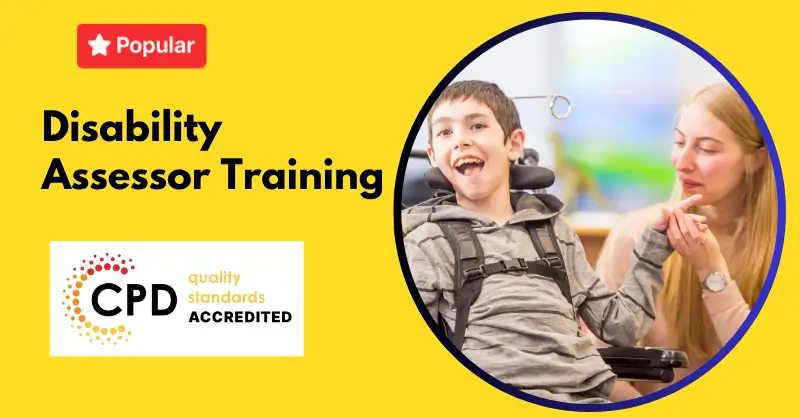 GIFT
GIFT
 Disability Assessor Training
Disability Assessor Training
Disability Assessor Training course equips participants with the knowledge and tools to conduct thorough and robust evaluations of individuals’ functional capacity, disability status and support needs. Throughout the curriculum – spanning legal frameworks, disability models, assessment methods, the International Classification of Functioning, Disability and Health (ICF), assistive technology, ergonomics and report-writing – learners will build confidence to perform assessments for benefit eligibility such as Personal Independence Payment (PIP), work as functional assessors and undertake roles in disability assessor jobs.
Following Courses are Included With This Course (For Free) - Limited Time!
 GIFT
GIFT
 GIFT
GIFT
Disability & SEN
 Course Description
Course Description
Every day, thousands of people depend on fair, accurate assessments to access vital support — and trained disability assessors are at the heart of that process. The Disability Assessor Training course empowers you to step into this essential role, helping individuals navigate life-changing evaluations such as assessments for PIP (Personal Independence Payment). Through this disability assessor course online, you’ll explore how to evaluate functional capacity, identify barriers, and apply evidence-based methods that transform assessment outcomes.
This comprehensive programme moves beyond theory. You’ll progress through modules covering disability assessment principles, legal frameworks and guidelines, disability models, and the International Classification of Functioning (ICF). You’ll also study assistive technology, ergonomics, and expert report writing, ensuring that every evaluation meets both ethical and professional standards. Designed to fit around your schedule, this disability assessor training online allows you to develop the expertise to perform functional assessments with precision and confidence.
By completing this disability assessor course, you’ll be prepared to pursue rewarding disability assessor jobs or functional assessor training roles within public or private organisations. You’ll understand how to conduct fair assessments, interpret policy frameworks, and present your findings in a way that supports both claimants and agencies. This is more than professional development — it’s your opportunity to make a measurable difference in people’s lives while advancing your career in a growing, respected sector.
 Learning outcome
Learning outcome
- - Interpret and apply the legislative, regulatory and policy frameworks governing disability assessment and benefit eligibility.
- - Analyse different disability models and select the most appropriate assessment methods for diverse claimants.
- - Design and execute assessment preparation and on-site procedures, including application of the ICF framework and ergonomics.
- - Evaluate and recommend assistive technologies and ergonomic adjustments to support functional independence during assessments.
- - Produce structured, clear and comprehensive assessment reports that meet professional standards for disability assessor roles.
Ebook Included with Course
Click Here See Demo Ebook →See a preview of our comprehensive training materials
 Why Choose This Disability Assessor Training?
Why Choose This Disability Assessor Training?
- Professionals seeking to transition into disability assessor jobs in the UK assessment sector.
- Healthcare practitioners or allied health staff wishing to broaden into functional assessor training and benefit assessment roles.
- Professionals aiming to undertake a disability assessor course online to adapt to hybrid or remote assessment environments.
- Practitioners who support claimants applying for PIP or other disability-related evaluations and want specialised training.
- Individuals desiring to understand and apply the ICF, assistive technology and ergonomic considerations within disability assessment work.

 Career Prospects & UK Salary Insights
Career Prospects & UK Salary Insights
Completing the Skill Up Disability Assessor Training opens doors to diverse and impactful career opportunities within the UK healthcare and welfare system. Here are some potential career paths with their average salary ranges:
| Job Role | Average UK Salary (Annual) | Key Responsibilities |
|---|---|---|
| Disability Assessor | £38,000–£42,000 | Conducts evaluations for benefits and support services, interprets claimant evidence and liaises with agencies. |
| Functional Assessor | £39,000–£46,000 | Assesses individuals’ functional capacity for work, social or disability benefits, often within government‐contracted roles. |
| Occupational Therapist | £40,000–£47,000 | Applies rehabilitation, ergonomic and assistive technology knowledge in assessment contexts and disability provision. |
| Rehabilitation Consultant | £85,000 | Expert role providing complex assessment, rehabilitation and functional outcome oversight; may lead teams. |
| Assessment Services Manager | £45,000–£55,000 | Oversees teams of assessors, ensures quality assurance, training, compliance and report standardisation in disability assessor service providers. |
| Disability Policy Officer | £49,000–£56,000 | Develops and influences policy on disability assessment, frameworks and service delivery; suitable for those interested in systemic change. |
Note: Salary ranges are averages and can vary based on experience, location, and specific employer.
 Frequestly Asked Questions
Frequestly Asked Questions
A Disability Assessor is a qualified healthcare professional who evaluates how a person’s medical condition or disability affects their ability to carry out everyday activities. In the UK, Disability Assessors play a key role in supporting benefit assessments such as the Personal Independence Payment (PIP) by conducting structured interviews and reviewing medical evidence to provide fair and accurate reports.
A Disability Assessor in the UK conducts face-to-face, telephone, or video assessments for individuals applying for disability-related benefits like PIP. Their main task is to evaluate how a person’s condition impacts their day-to-day life. They review medical documentation, ask detailed questions, observe functional abilities, and compile an objective report that helps the Department for Work and Pensions (DWP) make informed benefit decisions.
A PIP Disability Assessor is a registered healthcare professional—such as a nurse, physiotherapist, occupational therapist, or paramedic—trained to assess Personal Independence Payment (PIP) claims. They use their clinical expertise to evaluate how health conditions affect claimants’ ability to perform daily activities. The assessor’s report helps determine eligibility and the level of support a claimant receives.
To become a Disability Assessor in the UK, you must first be a registered healthcare professional, such as a nurse, paramedic, physiotherapist, or occupational therapist. You’ll then need to complete specialist training—often provided by DWP-contracted organisations like Capita, IAS (Atos), or Maximus. These training programmes teach you how to conduct assessments, write reports, and apply PIP assessment criteria effectively.
To qualify as a Disability Assessor, you must hold a valid registration with a recognised UK professional body such as the NMC (for nurses), HCPC (for physiotherapists and paramedics), or the GMC (for doctors). A minimum of two years’ post-registration experience in a clinical role is typically required. Additional training in disability assessment and report writing will be provided by your employer.
Yes, a midwife can become a Disability Assessor in the UK. As long as you are a registered healthcare professional with the Nursing and Midwifery Council (NMC) and have at least two years of clinical experience, you are eligible to apply. Midwives bring valuable communication and assessment skills that transfer effectively to the disability assessment role.
Yes, being a Disability Assessor is a highly rewarding and respected career in the UK. It offers an excellent work-life balance, structured hours, and opportunities for professional growth. Many assessors appreciate the variety of the role and the chance to use their clinical expertise in a non-hands-on environment while making a real difference in people’s lives.
In the UK, Disability Assessors typically earn between £35,000 and £45,000 per year, depending on experience and location. Senior or specialised assessors may earn over £50,000 annually. Many roles also include benefits such as flexible working hours, pension schemes, and ongoing professional development opportunities.
Working as a Disability Assessor involves a mix of clinical reasoning, interviewing, and report writing. You’ll interact with a wide range of individuals, each with unique conditions and circumstances. While the role can be challenging, it’s deeply rewarding for those who enjoy problem-solving and helping others navigate support systems. The structured working hours and supportive environment make it a popular career choice among healthcare professionals.
To become a PIP Disability Assessor, you must be a qualified healthcare professional with at least two years of post-registration experience. Apply to one of the DWP’s contracted providers, such as Capita, Maximus, or IAS. Once hired, you’ll complete accredited training that focuses on PIP assessment criteria, report writing, and professional interviewing techniques.
To assess PIP claims, you must be a registered healthcare professional (nurse, paramedic, occupational therapist, physiotherapist, or doctor) with a valid licence to practise in the UK. You’ll also receive specialist training from your employer covering PIP assessment guidelines, clinical reasoning, and disability analysis.
Absolutely. Many UK healthcare professionals build long-term careers as Disability Assessors. The role offers clear progression routes into senior assessor, clinical lead, or training positions. It also provides valuable transferable skills in communication, documentation, and case management—ideal for future healthcare or government roles.
A Disability Assessor’s main responsibility is to evaluate how a person’s physical or mental health conditions impact their ability to carry out daily activities. They conduct structured interviews, review medical evidence, make objective observations, and write detailed reports that inform benefit decisions. The role combines clinical expertise with analytical and communication skills.
To be a good Disability Assessor, you need strong communication, empathy, and attention to detail. You should be able to build rapport with claimants while maintaining objectivity. Excellent report-writing and time management skills are essential. Staying updated on DWP assessment guidelines and practising active listening will help you excel in this role.
You can receive training through organisations contracted by the Department for Work and Pensions (DWP), such as Capita, Maximus, or IAS (Atos). These employers provide full initial training and ongoing professional development. Alternatively, you can enhance your readiness with accredited online courses in disability assessment or PIP assessor training offered by UK learning providers like Skill Up, which prepares healthcare professionals for the assessor role.
Curriculum
-
Disability Assessment and Disability Assessor
00:20:00
-
Legal Frameworks, Policy and Guidelines
00:25:00
-
Disability Models and Disability Assessment Methods
00:22:00
-
Preparation for the Assessment
00:20:00
-
The Assessment Process
00:22:00
-
ICF and Disability Assessment
00:25:00
-
Assistive Technology and Ergonomics
00:25:00
-
Disability Assessment Report Writing
00:23:00
-
Disability Assessor Training – Ebook
00:20:00
-
Feedback
00:01:00
-
Get Your CPD Certificate
00:01:00
Offer Ends in

Or
 All
Courses for £49
All
Courses for £49
14-Day Money-Back Guarantee
-
Duration:3 hours, 24 minutes
-
Access:1 Year
-
Units:11



.png) 58 Reviews
58 Reviews 588 Students
588 Students



